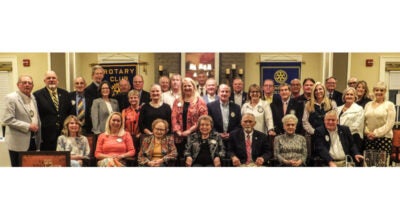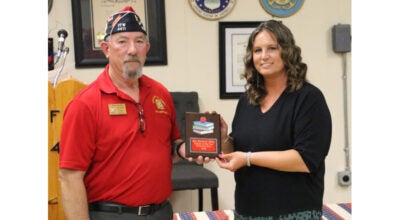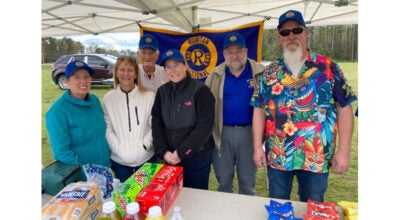Looking Back: Rogers loses life abroad
Published 5:46 pm Monday, December 23, 2019
|
Getting your Trinity Audio player ready...
|
By Clyde Parker
Dec. 25, 1944
A few weeks ago, Mrs. Bessie Davis Rogers of Courtland received a message from the United States War Department notifying her that her husband, Private Olden Douglas Rogers, of the U.S. Army, was killed on Oct. 18, 1944, while engaged in combat duty in Southern France.
Besides his wife, he is survived by two small sons; his mother, Mrs. B.B. Rogers of Courtland; and his brother, Rudolph Rogers of Franklin.
Private Rogers was born in Isle of Wight County on Aug. 27, 1911, to parents Ida Powell Rogers and Beverly Boothe Rogers. The following year, he moved with his family to Courtland where he lived prior to his enlistment in the U.S. Army. Douglas attended Courtland High School until June of 1927. He then spent two years as a student at Randolph-Macon Academy, after which he attended Randolph-Macon College.
For seven years, he was employed by the Richmond Guano Company. In 1941, Douglas formed a partnership with Edwin P. Westbrook Jr. in Courtland, this association being dissolved on Jan. 18, 1944, when Douglas enlisted in the U.S. Army. He was stationed at Camp Blanding, Florida; and, after receiving basic training there, he sailed from New York in June of 1944. He fought in Italy and France.
According to everybody, Douglas had a most pleasing personality, making friends wherever he went. His honesty and general stability of character was never questioned by those who knew him. Before entering the U.S. Army, he was a member of the Virginia Protective Force and, through that involvement, had distinguished himself as a fine marksman and soldier.
As of the initial report from the U. S. War Department, specific details of Private Rogers’ death were not known.
Beale awarded
Private James Irving Beale III, son of Mr. and Mrs. James I. Beale Jr. of Franklin, was recently awarded the United States Army’s “Silver Star Medal” for gallantry during combat action in France on August 30, 1944. He is assigned to Headquarters Company, 141st Infantry Regiment.
Private Beale was riding in the lead jeep of a motorized patrol that was assigned a mission to make night reconnaissance of an enemy-held route. A hostile enemy force attacked the patrol with direct fire from six machine guns, forcing the patrol squad members to seek cover. Contemptuous of personal safety, Private Beale opened fire with a .50 caliber machine gun; and, by making himself the target for enemy weapons, enabled his comrades to reach less exposed positions.
When a heavy concentration of enemy fire wounded him in the face and forced him to leave the machine gun, he immediately took up a position at the side of the road and resumed the fight, firing his rifle until it was torn from his hands by machine gun bullets.
The citation noted that his gallant action reflects great credit upon himself and the Armed Forces of the United States of America.
Hundley recognized
Corporal Thomas R. Hundley, son of Mr. and Mrs. T.F. Hundley of Sedley, was recently recognized for his bravery and ability to respond to an unusual circumstance while on duty with the U.S. Army in New Guinea.
The following article under the heading “Unsung Heroes” from the “Jungle Voice Weekly” newspaper was published by the 615th Infantry: “Production on a strategic boat construction job was held up recently when a cable snapped and fouled in the propeller of the boat. Corporal Thomas R. Hundley, without any orders, removed his clothing and plunged into the angry sea and proceeded to disentangle the cable. After long periods of dangerous underwater work beneath the craft, he managed to free the cable and production was again resumed with a minimum loss of time. We wish to extend our congratulations to you Corporal Hundley for your splendid spirit and indifferent attitude when faced with a task involving danger beyond the call of duty.”
Frankford talks to Rotarians
First Lieutenant Philip Frankfort of the U.S. Army’s Ninth Air Corps made a most interesting talk at last Friday’s Franklin Rotary Club luncheon. He spoke on some of his experiences during the invasion of Normandy by the United States and her Allies. Lt. Frankfort is a fighter pilot and flew a “Thunderbolt” P-47 covering the Normandy beachhead on June 6, 1944, D-Day — and for some time thereafter.
A graduate of Franklin High School and Virginia Tech, Lt. Frankfort has been in the United States Army Air Corps for four years, serving overseas since the first part of 1944. At present, he is on a 21-day furlough — spending time with his wife, the former Rae Hargrave; his children; and his parents, Elise Ellis Frankfort and Harry M. Frankfort.
As earlier stated, prior to his return to the United States, Lt. Frankfort had been in France ever since D-Day. While in France, he was flying from four different airfields there. He now wears two stripes indicating his many major aerial engagements.
At the end of his furlough, he will report to a station in Miami.
Of special note is the fact that his brother, First Lieutenant Wynans Ellis Frankfort, also a “Thunderbolt” P-47 fighter pilot but in the Pacific Theater of the war, earlier, in May of 1944, was shot down near the island of Biak. As of Dec. 1, 1944, he was still considered missing in action.





